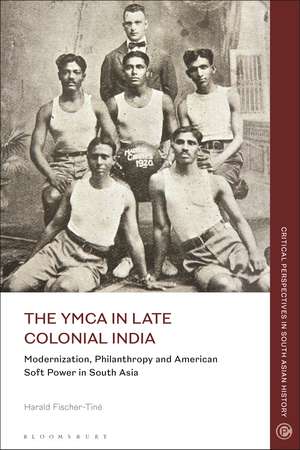The YMCA in Late Colonial India: Modernization, Philanthropy and American Soft Power in South Asia: Critical Perspectives in South Asian History
Autor Harald Fischer-Tinéen Limba Engleză Hardback – 30 noi 2022
| Toate formatele și edițiile | Preț | Express |
|---|---|---|
| Paperback (1) | 193.36 lei 6-8 săpt. | +73.99 lei 7-13 zile |
| Bloomsbury Publishing – 29 mai 2024 | 193.36 lei 6-8 săpt. | +73.99 lei 7-13 zile |
| Hardback (1) | 512.37 lei 6-8 săpt. | |
| Bloomsbury Publishing – 30 noi 2022 | 512.37 lei 6-8 săpt. |
Preț: 512.37 lei
Preț vechi: 732.34 lei
-30% Nou
Puncte Express: 769
Preț estimativ în valută:
98.04€ • 102.57$ • 81.44£
98.04€ • 102.57$ • 81.44£
Carte tipărită la comandă
Livrare economică 02-16 aprilie
Preluare comenzi: 021 569.72.76
Specificații
ISBN-13: 9781350275287
ISBN-10: 135027528X
Pagini: 312
Ilustrații: 10 bw illus
Dimensiuni: 156 x 234 mm
Greutate: 0.61 kg
Editura: Bloomsbury Publishing
Colecția Bloomsbury Academic
Seria Critical Perspectives in South Asian History
Locul publicării:London, United Kingdom
ISBN-10: 135027528X
Pagini: 312
Ilustrații: 10 bw illus
Dimensiuni: 156 x 234 mm
Greutate: 0.61 kg
Editura: Bloomsbury Publishing
Colecția Bloomsbury Academic
Seria Critical Perspectives in South Asian History
Locul publicării:London, United Kingdom
Caracteristici
Provides insights into the history of South Asia in the age of late colonial reformism and decolonization
Notă biografică
Harald Fischer-Tiné is Professor of Modern Global History at ETH Zurich, Switzerland. He has published extensively on global history, South Asian colonial history and the history of the British Empire.
Cuprins
List of IllustrationsAcknowledgementsIntroduction Rationale of the book Modernization or Modernity? Note on Sources and Literature Spatio-chronological frameworks and chapter previews 1. A mission to modernize: colonial administrators, nationalists, and religious bodies in South Asia (1870s-1930s) Modernizing missions in late colonial India: actors and agendas The Y's Passage to India: A brief institutional history of the Indian YMCA 2. 'Make them pure, fit and brotherly!': The Indian YMCA's welfare work for railwaymen and soldiers (c. 1904-1945) Towards war work: early philanthropic efforts (1890-1914) Entertainment, caregiving, and 'intercultural training': the association's service on the home front Targeting the sepoy: the YMCA triangle on the battlefields of Europe and the Middle East The contradictions of Y-philanthropy: issues of sexual purity and racial hierarchies Summing up 3. 'Physical ministry': The Indian YMCA's sport and physical education programmes (c. 1900-1950) In quest of strength and manhood: The place of sports and physical culture in British India Preparing for the 'modern strain': science and physical education in the American YMCA Working out India: American physical educators and their programmes Somatic orientalism and Indian Eigensinn: limitations and modifications of the YMCA's 'democratising fitness' project Summing up 4. 'One fifth of the world's boyhood' American 'boyology' and the Indian YMCA's work with early adolescents (c. 1900-1950) Contours of the "Boy Problem" in the United States and India The development of boys' work in the Indian YMCA 'The field of action': motives and methods of YMCA boys' work in South Asia Summing up 5. The 'gospel of rural reconstruction': the YMCA's rural development programmes in South Asia (c. 1916-1955) Historicizing rural development schemes in India A Man with a mission: Duane Spencer Hatch and the Martandam Rural Demonstration Centre (MRDC) From southern Travancore to southern Arizona: the regional and global circulation of 'low modernist' rural development knowledge Summing up 6. Concluding observations: modernization without modernity? Bibliography
Recenzii
Meticulous scholarship and innovative research make this a highly original contribution to understanding the historical significance of American "soft power" in South Asia. By foregrounding the seminal role of transnational agency and Americanization on India and Indians, the book radically reconfigures the story of colonial India and nationalist opposition.








